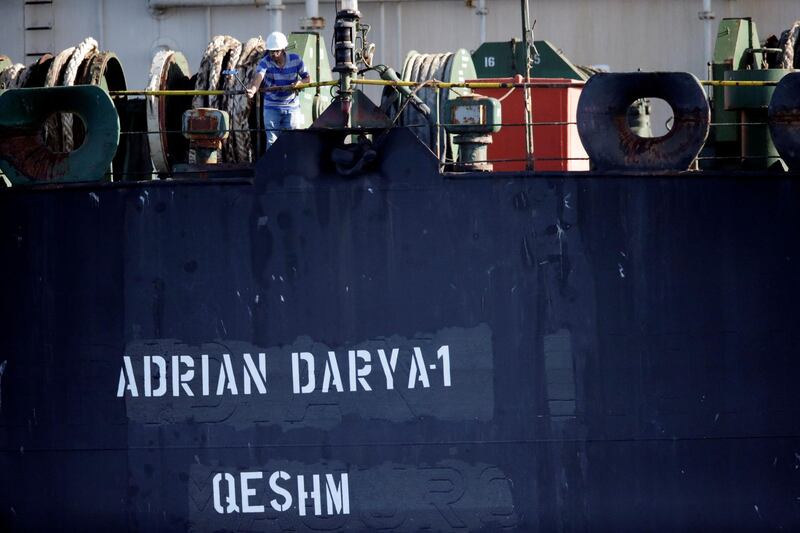Greece said on Wednesday it would not endanger its relations with the US by aiding an Iranian supertanker released by Gibraltar and currently in the Mediterranean Sea.
Deputy Foreign Minister Miltiadis Varvitsiotis said Athens was under pressure from US authorities, who claim the Iran-flagged Grace 1 is tied to a sanctioned organisation.
The 330-metre tanker, recently renamed the Adrian Darya-1, was too big to enter any Greek port and could not legally unload its $130 million worth of light crude at EU refineries, Mr Varvitsiotis told Antenna TV.
The vessel can still enter Greek waters or anchor offshore, in which case Athens will consider what it will do, he said.
The affair is threatening to pull Greece into a growing confrontation between Iran and the West after US President Donald Trump pulled Washington out of Tehran's nuclear deal with world powers more than a year ago.
Mr Trump then reimposed strict sanctions on Iran, largely halting the sale of Iran's crude oil internationally and sharply depreciating its currency.
The supertanker left Gibraltar on Sunday after being held up for a month for trying to breach EU sanctions on Syria.
Gibraltar authorities rejected attempts by the US to seize the Grace 1, arguing that EU regulations were less strict than US sanctions on Iran.
Gibraltar also said Iran provided assurances that the tanker would not unload its cargo in Syria.
US Secretary of State Mike Pompeo warned on Tuesday that the US would take every action it could to prevent the Grace 1 from delivering oil to Syria in breach of US sanctions.
"We have made clear that anyone who touches it, anyone who supports it, anyone who allows a ship to dock is at risk of receiving sanctions from the US," Mr Pompeo said.
"If that ship again heads to Syria we will take every action we can, consistent with those sanctions, to prevent that."
The ship's declared destination is now the southern Greek port of Kalamata, where a vessel of that size and draught would have to anchor almost a kilometre offshore.
The ship is in the waters off Algeria and expected to reach Kalamata on August 26, ship tracking service MarineTraffic said.
Greek authorities say they have received no official notification of where the ship is heading, or any request for it to moor at Kalamata.
Meanwhile, in the Red Sea, the Iranian oil tanker Helm made a distress call on Tuesday after experiencing technical difficulties off the Saudi port of Yanbu.
The vessel, one of the world’s largest crude tankers, signalled distress at 6.30am Iran time on Tuesday, about 120km offshore, its owner NITC said.
Both the ship and crew are safe and stable, NITC said, without saying whether the Helm will continue its voyage.
The tanker showed minimal movement in the immediate area on Wednesday.
Iran’s tanker fleet is under global scrutiny amid US sanctions trying to block the country’s crude sales.
HELM is a partially-laden VLCC supertanker. She is dimensioned to transport 2 million barrels but in order for her to traverse the Suez Canal, she is only carrying 1.3 million barrels to meet the draft depth requirements.
— TankerTrackers.com, Inc. (@TankerTrackers) August 21, 2019
Iranian tankers have turned off their satellite transponders intermittently in an attempt to hide their crude deliveries.
The Helm appears to have used that strategy since loading some crude in Iran in May.
It is unclear when the Helm entered the Red Sea or what was the ship's last port of call.
Until this week when the vessel made its distress call, its last known position was in the Gulf in May when satellite signals showed the tanker was half full and heading for the Suez canal.
The Helm, capable of carrying about 2 million barrels of crude, is not full, ship-tracking data compiled by Bloomberg showed.
The tanker last reported its status as “not under command".








